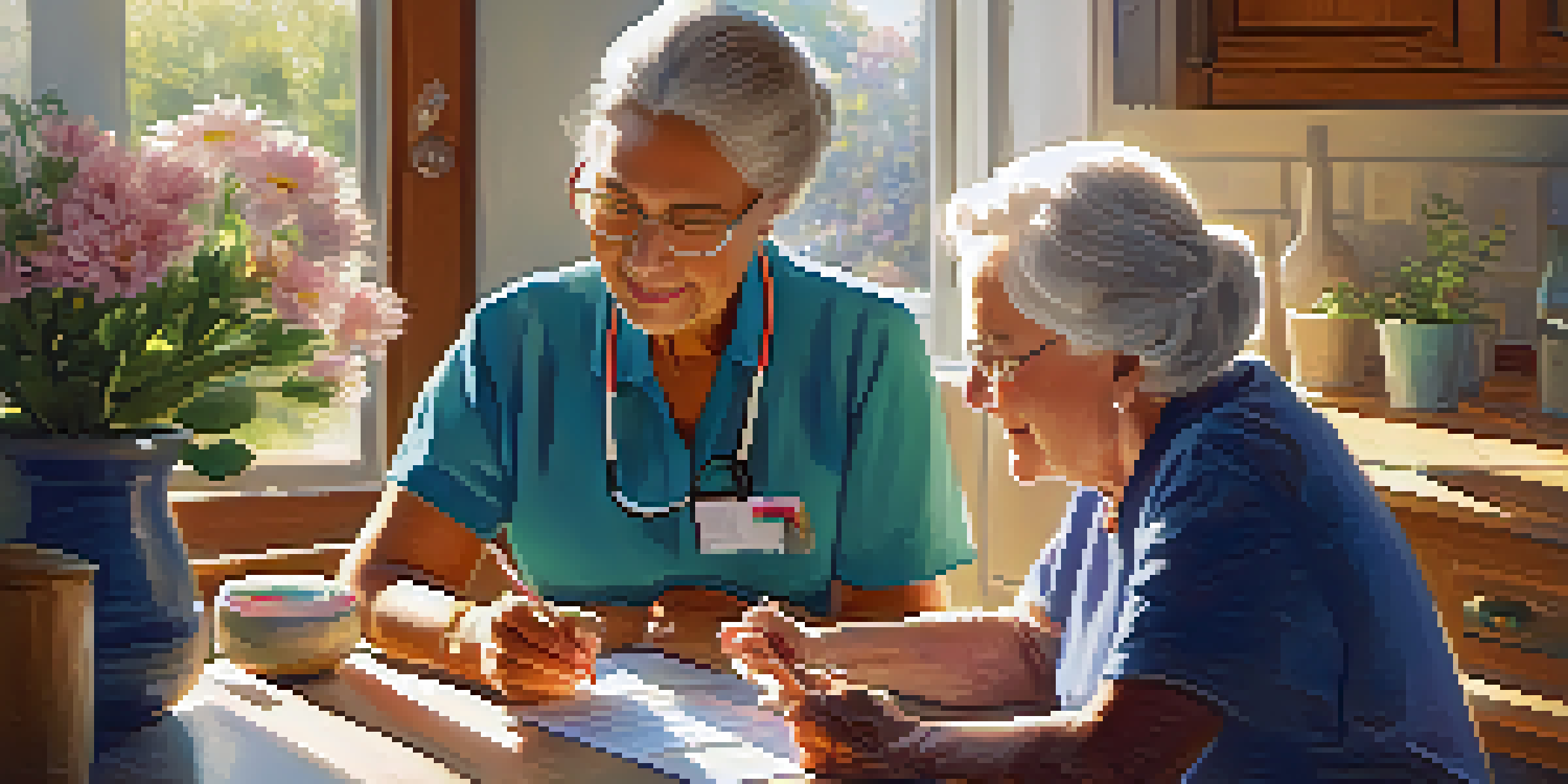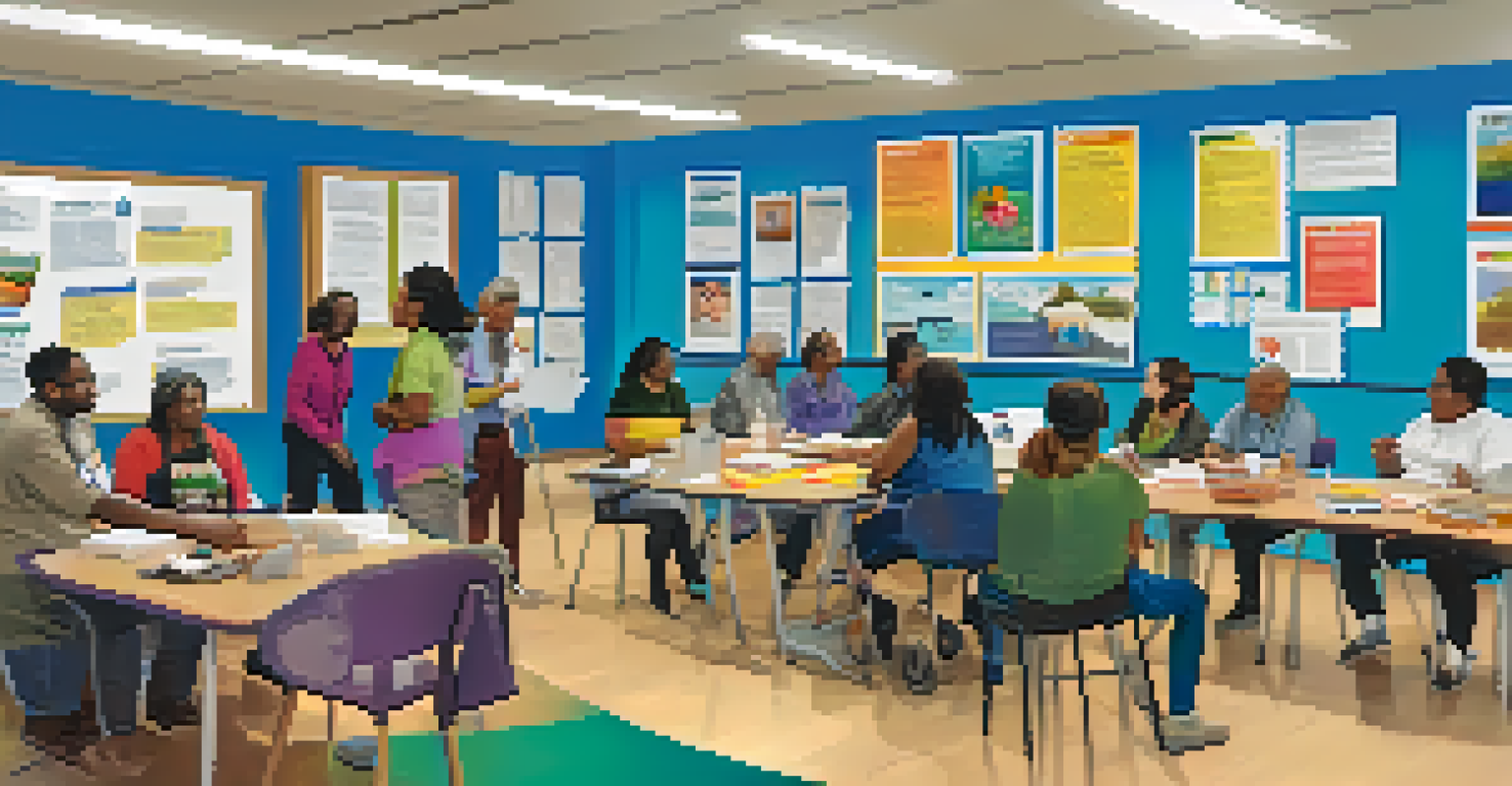Health Literacy for Caregivers: Supporting Loved Ones

What is Health Literacy and Why Does It Matter?
Health literacy refers to the ability to understand basic health information and make informed decisions about medical care. It's crucial because it empowers individuals to navigate the healthcare system effectively. When caregivers possess health literacy, they can better support their loved ones in managing conditions and making choices that enhance their quality of life.
Health literacy is the ability to obtain, process, and understand basic health information and services needed to make appropriate health decisions.
For example, a caregiver who understands medication instructions can ensure their loved one takes the right dosage at the right time. This understanding not only prevents potential health risks but also fosters a sense of trust and security for both parties. Ultimately, better health literacy leads to improved health outcomes and more satisfying healthcare experiences.
In a world where medical jargon can often seem like a foreign language, caregivers play a vital role in bridging that gap. By fostering an environment where questions are welcomed and information is shared, caregivers can help their loved ones feel more confident in their health journey.
Identifying Your Loved One's Health Literacy Needs
Not all individuals have the same level of health literacy, and it's essential for caregivers to identify specific needs. This can be done by having open conversations about their understanding of their health conditions and treatments. By assessing how well they comprehend their situation, caregivers can tailor their support accordingly.

For instance, if a loved one struggles with understanding their diagnosis, caregivers can simplify complex terms and provide relatable examples. This not only aids comprehension but can also alleviate anxiety associated with unfamiliar medical language. Regular check-ins can help gauge their understanding and reinforce important information over time.
Health Literacy Empowers Caregivers
Understanding health information helps caregivers support their loved ones in making informed medical decisions.
Additionally, caregivers should be observant of non-verbal cues, such as confusion or frustration. Recognizing these signs early can make a significant difference in addressing any gaps in understanding, ensuring that loved ones feel supported and informed every step of the way.
Effective Communication Strategies for Caregivers
Effective communication is the cornerstone of health literacy. Caregivers should aim to use clear, simple language when discussing medical information. Instead of bombarding loved ones with technical terms, it's beneficial to explain things in a straightforward manner, making sure they feel comfortable asking questions.
The ability to communicate effectively with patients can lead to better health outcomes.
For example, using analogies can help make complex medical concepts more relatable. If explaining blood pressure, you might say it's like the pressure of water in a hose—the higher the pressure, the faster the water flows. This approach fosters understanding and encourages a collaborative environment where loved ones feel empowered to engage in their health.
Moreover, active listening is just as important as clear speaking. Caregivers should encourage their loved ones to share their thoughts and concerns. This two-way communication builds trust and promotes a supportive dynamic, ultimately leading to better health decisions.
Utilizing Resources to Enhance Health Literacy
In today's digital age, there are numerous resources available to aid in health literacy. Caregivers can leverage websites, apps, and educational materials designed specifically for patients and their families. Seeking out trustworthy resources can empower caregivers and their loved ones with accurate and relevant health information.
For instance, organizations like the CDC and WHO provide user-friendly guides on various health topics. Additionally, local libraries often offer health workshops or access to community health programs. Engaging with these resources can help caregivers stay informed and share valuable information with their loved ones.
Effective Communication is Key
Using clear language and encouraging questions fosters an environment where loved ones feel comfortable engaging in their health.
Furthermore, caregivers can encourage their loved ones to attend doctor appointments together. This not only allows them to ask questions in real-time but also reinforces the importance of being proactive about their health. Together, they can explore resources and strategies that enhance understanding and foster better health practices.
Encouraging Questions and Active Participation
One of the most effective ways to enhance health literacy is by encouraging loved ones to ask questions. Caregivers should create a safe space where they feel comfortable expressing their concerns and uncertainties. This not only empowers individuals but also helps clarify any misconceptions they may have about their health.
For example, caregivers can prompt discussions by asking questions like, 'What do you think about your treatment plan?' or 'Is there anything you're unsure about?' Such open-ended questions can lead to meaningful conversations that promote understanding and foster engagement.
Additionally, caregivers can encourage loved ones to take notes during medical appointments. Writing down important information can help reinforce learning and serve as a reference for later discussions. This proactive approach to communication can significantly improve health literacy and outcomes.
Navigating Healthcare Systems Together
Healthcare systems can be overwhelming, but caregivers can help their loved ones navigate them more effectively. Understanding insurance options, scheduling appointments, and knowing whom to contact for questions are essential skills. By guiding loved ones through these processes, caregivers can alleviate stress and create a more organized approach to managing health.
For instance, caregivers can assist in creating a list of questions to ask healthcare providers during appointments. This preparation not only ensures that important topics are covered but also helps loved ones feel more involved in their care. Having a clear plan can make the healthcare experience far less daunting.
Emotional Support Enhances Learning
Providing emotional reassurance alongside knowledge boosts confidence and promotes better health management.
Moreover, caregivers can help keep track of medical records and medication schedules. By organizing this information, caregivers can empower their loved ones to stay on top of their health needs, enhancing their overall health literacy and confidence in managing their well-being.
The Role of Emotional Support in Health Literacy
While knowledge is crucial, emotional support is equally important in fostering health literacy. Caregivers should be there to listen and provide encouragement during challenging times. This emotional backing can help loved ones feel more secure and open to discussing their health concerns.
For example, if a loved one is anxious about a medical procedure, a caregiver can offer reassurance and remind them that it's okay to express their fears. This emotional connection can pave the way for more fruitful conversations about health and wellness, ultimately enhancing understanding and compliance.

Additionally, celebrating small victories in health management can boost confidence. Whether it's sticking to a medication schedule or making healthier food choices, recognizing these efforts can motivate loved ones to continue prioritizing their health. This blend of knowledge and emotional support creates a well-rounded approach to health literacy.
Conclusion: Empowering Loved Ones Through Health Literacy
In conclusion, health literacy is a vital skill that caregivers can help cultivate in their loved ones. By fostering open communication, utilizing resources, and providing emotional support, caregivers can empower individuals to take charge of their health. This collaborative approach not only enhances understanding but also builds trust and strengthens relationships.
Ultimately, the goal is to create an environment where loved ones feel confident in navigating their health journeys. By equipping them with the knowledge and support they need, caregivers can help them make informed decisions and advocate for their own health.
Remember, health literacy is a journey, not a destination. With patience, understanding, and a commitment to learning together, caregivers can make a profound impact on the health and well-being of their loved ones.